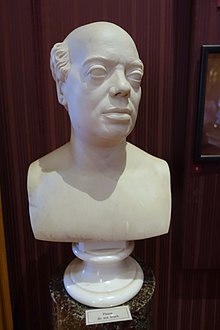Nathan Mayer Rothschild
Born in Frankfurt am Main, he was the third of the five sons of Mayer Amschel Rothschild and his wife, Guttle (née Schnapper).
Up until this point, the few Ashkenazi Jews who lived in England tended to belong to the "Antients" on account of their generally lower social class, while the more established Sephardim joined the Moderns.
From 1811 on, in negotiation with Commissary-General John Charles Herries, he undertook to transfer money to pay Wellington's troops, on campaign in Portugal and Spain against Napoleon, and later to make subsidy payments to British allies when these organized new troops after Napoleon's disastrous Russian campaign.
Within it, he made claims about Nathan Mayer Rothschild's early knowledge of the outcome of the Battle of Waterloo, whose couriers delivered information about the victory back to London before the British Cabinet itself knew, claiming that he used this knowledge to speculate on the London Stock Exchange and make a vast fortune by unfair advantage against the other British stock holders, essentially defrauding them.
[10] Historian Niall Ferguson agrees that the Rothschilds' couriers did get to London first and alerted the family to Napoleon's defeat, but argues that since the family had been banking on a protracted military campaign, the losses arising from the disruption to their business more than offset any short-term gains in bonds after Waterloo.
Rothschild capital did soar, but over a much longer period: Nathan's breakthrough had been prior to Waterloo when he negotiated a deal to supply cash to Wellington's army.
The family made huge profits over a number of years from this governmental financing by adopting a high-risk strategy involving exchange-rate transactions, bond-price speculations, and commissions.
"[12] It is also very commonly reported that the Rothschilds' advanced information was caused by the speed of prized racing pigeons, held by the family.
[16] More recently, Brian Cathcart has refuted the claim that Rothschild was the first man in London to know of the victory at Waterloo.
[17] He traces the earliest news to a dispatch Wellington sent via his messenger to Lord Bathurst, the Secretary of War, which was received on the evening of 21 June.
He gained a position of such power in the City of London that by 1825–1826 he was able to supply enough coin to the Bank of England to enable it to avert a liquidity crisis.
In 1818, Nathan Meyer applied for a grant of arms, on learning that gentry status would suffice, and had the Five Arrows confirmed for himself and his wider family.
He received a £2,571 compensation payment, at the time (worth £308,196 in 2025)[25][27] In 1835 he secured a contract with the Spanish Government giving him the rights to the Almadén mines in southern Spain, effectively gaining a European mercury monopoly.
"[33] The German poet Heinrich Heine, a Jewish convert to Lutheranism, declared "money is the God of our time and Rothschild is his prophet",[33] he described Nathan Mayer Rothschild as one of "three terroristic names that spell the gradual annihilation of the old aristocracy", alongside Cardinal Richelieu and Maximilien Robespierre.
[34] For Heine, Richelieu had destroyed the power of the old feudal aristocracy, Robespierre had "decapitated" its weakened remnant and now Rothschild signified the creation of a new social elite, as new lords of finance.
[34] On 22 October 1806 in London, he married Hannah Barent-Cohen (1783–1850), daughter of Levy Barent Cohen (1747–1808) and wife Lydia Diamantschleifer.
"[35] An anonymous contemporary described Nathan Rothschild at the London Stock Exchange as "he leaned against the 'Rothschild Pillar' ... hung his heavy hands into his pockets, and began to release silent, motionless, implacable cunning":[36] Eyes are usually called the windows of the soul.
The visiting figure, which has the appearance of coming by accident and not by design, stops just a second or two, in the course of which looks are exchanged which, though you cannot translate, you feel must be of most important meaning.


